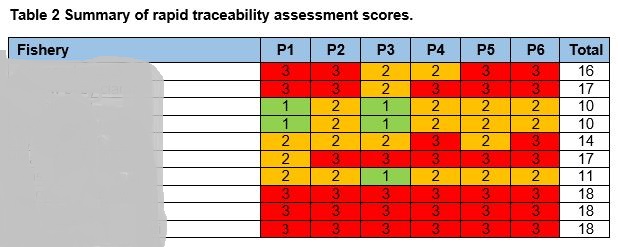This project provided a simple summary analysis of ten fisheries selected by WWF-US against WWF’s Traceability Principles for wild caught fish . Seafood traceability has emerged as a key tool against the trade in illegal, unreported and unregulated (IUU) fish and is particularly important for responsible companies that are looking to ensure supply chain security. WWF national offices through their partnerships with seafood industry are improving the traceability and these principles were developed to assist these private sector partners in asking the right questions when assessing their supply chains.
The six traceability principles as outlined are as follows:
1. Essential information;
2. Full Chain Traceability;
3. Effective Tracking of Product Transformations;
4. Digital Information and Standardized Data Formats;
5. Verification; and
6. Transparency and Public Access to Information.
This project assessed the likelihood of each of the principles being met for particular fisheries. This has been based on tangible evidence and MRAG's experience of similar fisheries (i.e. the same species, gear, region, scale etc.) but without an exhaustive series of data requests. At the end of the assessment an indication is given in terms of a simplified ranking for the species identified highlighting those at higher or lower risk.

